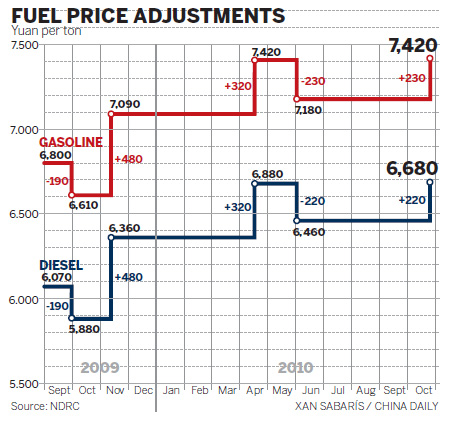-
News >Bizchina
Gasoline, diesel prices rise
2010-10-26 09:07
Increases 'in line with global market changes'
BEIJING - Gasoline and diesel retail prices rose by around 3 percent on Tuesday to reflect global market fluctuations, according to the National Development and Reform Commission (NDRC), the country's top economic planner.
Gasoline prices would go up by 230 yuan ($34) per ton, and diesel prices by 220 yuan per ton, the NDRC said on Monday. Following the adjustments, gasoline prices are now 7,420 yuan per ton with diesel trading at 6,680 yuan per ton.
It is the second price hike this year.
The move is in line with global oil prices that have increased by more than the 4 percent threshold since the end of September, an NDRC official, who declined to be named, said.
Under a 2009 pricing mechanism, the government considers adjusting domestic refined oil prices when international oil prices change more than 4 percent within 22 working days.
Under the system, China adjusted fuel prices three times this year, with two price hikes and one reduction.
The government adjusted oil prices eight times in 2009.
"The latest price rise is moderate and within market expectations," said Lin Boqiang, director of the China Center for Energy Economics Research at Xiamen University.
Compared to coal that accounts for around 70 percent of the country's energy consumption, oil plays a smaller part in the mix and the hike will not dramatically affect the consumer price index (CPI), said Lin.
The NDRC said on Monday that a new price mechanism is expected to be finalized by the end of the year.
"The new regime will be more flexible in reflecting market changes and reducing manipulations, eventually forming a market-oriented mechanism," the NDRC official said.
Energy demand
China is expected to see a further slowdown in energy demand growth in the fourth quarter due to conservation policies, the National Energy Administration (NEA) said on Monday.
Electricity use, a barometer of the economy, will continue to see slow growth in the fourth quarter. However, it does not mean a slowdown in the economy, Wang Siqiang, an official with the NEA, told a press conference on Monday.
Figures for electricity use will still increase in the fourth quarter, he said.
A weakening in the growth of energy demand is in line with the government's increasing efforts in conservation, said Wang. China aims to reduce energy consumption per unit of gross domestic product (GDP) by 20 percent between 2006 and the end of this year.
China consumed 349.8 billion kWh of electricity in September, a month-on-month drop of 12 percent, with heavy industry using 193.9 billion kWh of electricity, a monthly drop of 17.3 percent, the NEA said.China's economy grew 9.6 percent in the third quarter, the lowest rate in a year, as the government reined in credit growth, clamped down on property speculation and chased energy efficiency and pollution targets.
China's net coal imports are expected to be 120 million tons this year, up by 16 percent from a year earlier, according to the NEA.
The country is expected to produce 200 million tons of crude oil, and process 390 million tons of oil this year, it added.
Natural gas supplies may be "tight" this winter and in the following spring, according to the NEA.
The administration has ordered PetroChina, the country's biggest oil and gas producer, to operate its gas fields at full capacity during the winter. Sinopec and CNOOC have also been told to increase gas supplies, said Wang.
